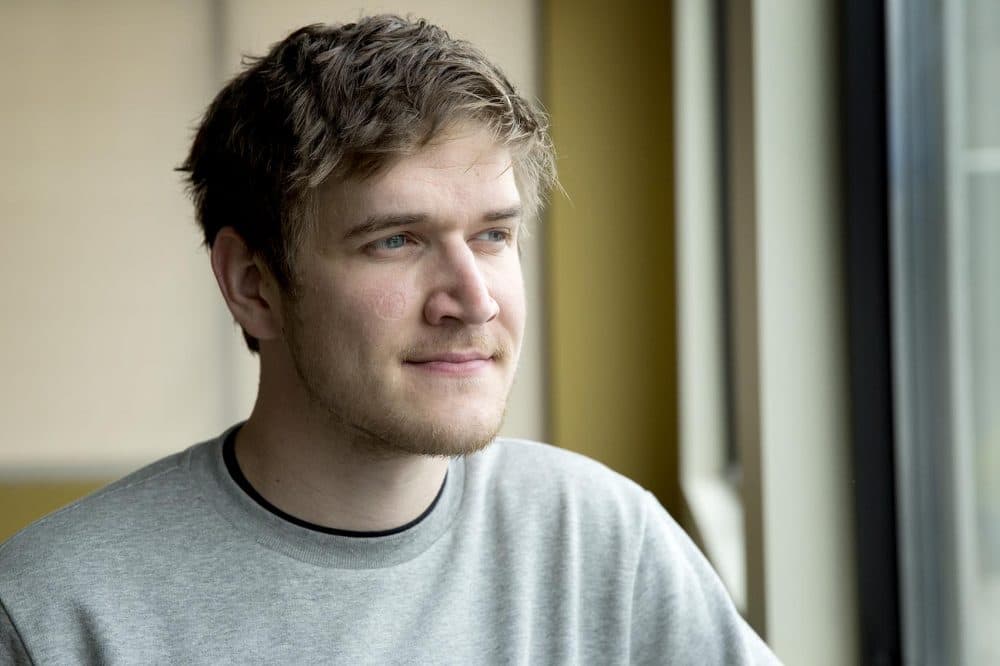Advertisement
Bo Burnham's 'Eighth Grade' Is A Coming-Of-Age Story In The Internet Era
Resume
"Eighth Grade" stars Elsie Fisher as Kayla, a smart but sometimes excruciatingly awkward kid struggling with the difficult transition from middle to high school.
Kayla's world is dominated by the typical concerns of any eighth grader, like becoming popular and having a boyfriend. But, the film also depicts what it's like to grow up with unfettered access to the internet and social media.
"Eighth Grade" was written and directed by Massachusetts native Bo Burnham, a comedian and actor who got his start by posting musical comedy videos on YouTube.
Guest
Bo Burnham, writer and director of "Eighth Grade." He tweets @boburnham.
Interview Highlights
On where the inspiration came from for "Eighth Grade":
“A lot of movies in this space tend to be remembered and I like remembered movies but I wanted to make a movie that was visceral because I do believe the way that this age feels is different than the way that it is remembered by adults. I also think that kids are experiencing something different than I experienced in 2003 or someone experienced in another decade because of technology and because of the culture.”
"That was the inspiration, wanting to talk about the internet, wanting to talk about feelings around the internet, to have a conversation around the internet that's a little subtler than — Russia, you know, cyber bullying — to do a sort of granular look.”
On how the film talks about the internet and teenagers relationship with it:
"[I wanted to just] depict the effect and to not prescribe, to not do a TED Talk. Sometimes when we talk about the internet, it feels like, in culture, we're talking about it prescriptively as parents, as worriers."
"For me, anyone that knows enough about the internet doesn't have any solid ground under their feet to talk about it. It feels like to know the internet is to be awash in it and drowning in it and grasping for meaning."
"So, that's sort of the portrayal of it. To say 'I don't know what it is. I don't know if it's good or bad. It's sort of neutral.... [Kayla's] hyper-connected, she's lonely, she's overstimulated, she's numb. It's just portraying what [it feels] like to go to bed at the end of the day and to choose between every piece of information in the history of the world on your phone or the back of your eyelids..."
"When these 13-year-olds grow up to become social scientists, I'll be very curious to hear what they have to say about the internet. But, until then, I feel like we should just sort of take inventory maybe of what's happening, you know, and then let them speak with authority on it because I just don't think there's enough information to speak with authority on the internet yet."
On how he sees parts of himself in the main character, Kayla:
“My sort of anxiety didn't awaken [until I was] probably a sophomore in high school… But, I see myself in her. You know, I was having panic attacks backstage at the Shubert Theatre instead of before a pool party in a bathroom. But the feelings are the same."
"That was the hope [of the movie], to look at this 13-year-old girl and say 'I can see myself in you now. We are the same. We feel the same.' "
On his experience directing — and getting into the mind of — an eighth grade girl:
"I was very aware of being a man in this position ... and just tried to subjugate myself to [Elsie Fisher’s] truth and told [her] all the time: 'You know what, this is not me. You show me what it's like. You are the expert on this.' "
"Also, again, to just trust that I could know her. Believing that I could understand her, let me understand her. You know, people write movies about World War I soldiers and like creatures that live in volcanoes. I can understand a girl. You know, I felt that way.”
On how the internet has been portrayed in other media and culture:
“A problem I see with the internet portrayed in media is that it's always portrayed too significantly. If they're going to portray the internet, it will be a huge plot device. Something will go viral. I'm very happy to have a movie where someone doesn't go viral. As opposed to just having the internet be atmosphere, part of their life.”
“That's the hope of the movie is that it just portrays it without commentary. It just portrays it as it is in our lives, which is already integrated. Sometimes you see kids in movies and they're going like, ‘Oh my gosh, that was hashtag savage,’ and you're like ‘No, kids don't talk like.' That's how a 40-year-old thinks a kid talks.”
“I think as younger people that actually grow up with the internet, like me, start to make things, you will see the internet be portrayed a little more emotionally and less satirized. It's like why satirize the internet? The internet's already self-satirizing."
This segment aired on July 12, 2018.


